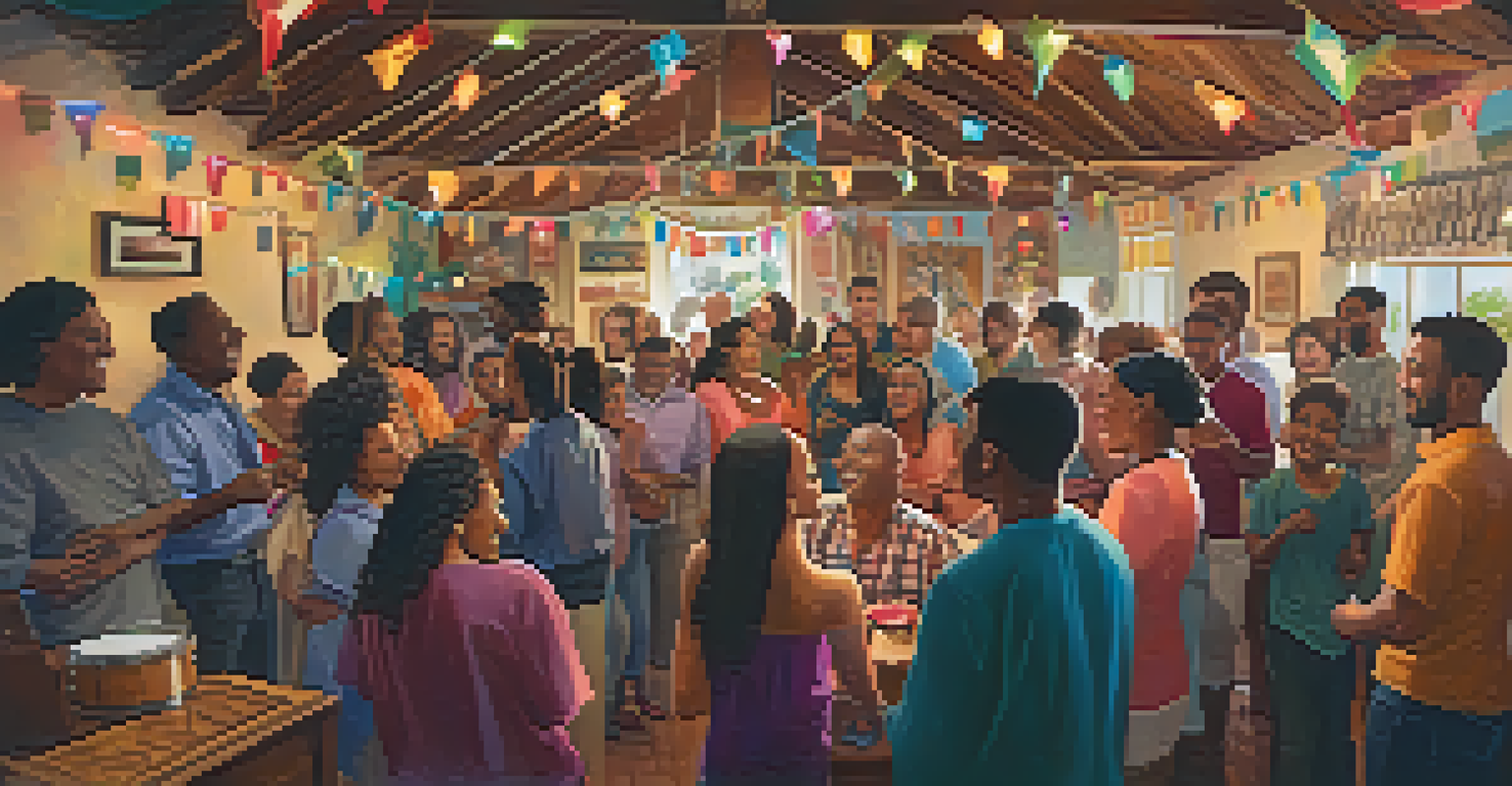The Healing Power of Music in Spiritual Practices Today

Understanding Music's Role in Spirituality
Music has been intertwined with spirituality for centuries, acting as a bridge between the physical and the divine. Many cultures have used music in rituals, chants, and ceremonies to evoke a sense of connection beyond the everyday world. This deep-rooted relationship is not just historical; it continues to flourish in today's spiritual practices.
Music is the shorthand of emotion.
When we listen to or create music, our brains respond by releasing dopamine, the 'feel-good' hormone. This reaction can facilitate emotional healing, making music a powerful tool in spiritual environments. Whether it's through drumming circles, singing hymns, or ambient soundscapes, music can create a safe space for personal reflection and growth.
In contemporary spirituality, many practitioners incorporate music to enhance meditation, prayer, and rituals. It serves as a catalyst that helps individuals explore their inner selves and connect with higher energies, fostering a profound sense of peace and unity.
The Science Behind Music and Healing
Research shows that music can have significant effects on our mental and emotional health. Studies have indicated that listening to soothing music can lower stress levels, reduce anxiety, and improve mood, making it a valuable asset in spiritual healing practices. This scientific backing adds weight to what many already intuitively know—music can heal.

The field of music therapy is a prime example of how music can be harnessed for healing. Trained therapists use music to address various psychological and physical ailments, demonstrating its therapeutic benefits. This practice emphasizes that music is not merely entertainment; it can be an essential tool for recovery and emotional well-being.
Music Enhances Spiritual Experiences
Music serves as a powerful tool in spirituality, facilitating emotional healing and deeper connections during meditation and rituals.
In spiritual contexts, these benefits are amplified, as music often accompanies moments of introspection and connection. Participants might find that a simple melody can evoke memories, facilitate emotional release, and deepen their spiritual experience.
Music as a Tool for Meditation and Mindfulness
Meditation and mindfulness practices often utilize music to enhance focus and tranquility. Gentle melodies and nature sounds can help quiet the mind, allowing deeper introspection and presence during meditation sessions. This immersive experience can lead to heightened awareness of one’s thoughts and feelings.
Where words fail, music speaks.
Many meditation guides incorporate specific soundtracks to facilitate different meditation styles, whether it’s a guided visualization or a silent mindfulness practice. These musical elements help create a conducive atmosphere, making it easier for practitioners to delve into a state of calm and reflection.
Furthermore, live music during meditation sessions can create a communal experience, uniting participants in their spiritual journeys. The shared energy of music can amplify individual experiences, fostering a sense of belonging and collective healing.
Chanting and Sound Healing Practices
Chanting has been a staple in spiritual practices across various traditions, from Gregorian chants in Christianity to mantra recitations in Buddhism. This practice not only involves vocalization but also engages the listener's mind and spirit, creating a rhythm that resonates deeply within. The repetitive nature of chanting can induce a meditative state, enhancing spiritual experiences.
Sound healing, which utilizes instruments like singing bowls, gongs, and tuning forks, further exemplifies how sound can facilitate healing. These vibrations work on a cellular level, promoting relaxation and balance in the body’s energy. Practitioners often report profound shifts in their emotional and physical states after sound healing sessions.
Community Strengthens Musical Bonds
Gathering in communal musical experiences fosters unity and enhances individual spiritual journeys through shared energy and connection.
Incorporating these practices into spiritual rituals can transform the atmosphere, making the experience more immersive and therapeutic. The intentional use of sound fosters a sacred space, encouraging participants to connect with their spiritual selves.
Creating Sacred Spaces with Music
The right music can turn any space into a sacred environment. Whether it's through playing soft instrumental tracks or nature sounds, music helps set the tone for spiritual practices. By curating specific playlists or selecting live music, individuals can create an atmosphere that invites reflection and connection.
Sacred spaces are often defined by their ability to foster tranquility and introspection. Music plays a pivotal role in this, as it can evoke emotions and memories that facilitate deep inner work. Practitioners can enhance their spiritual experiences simply by being mindful of the sounds around them.
Moreover, creating a personal sacred space with music allows for a unique expression of one's spirituality. It empowers individuals to tailor their experiences, making spiritual practices feel more authentic and aligned with their personal journeys.
The Role of Community in Musical Spirituality
Communal musical experiences have a profound impact on spiritual practices. Gathering with others to sing, drum, or engage in sound healing can create a sense of unity that enhances individual experiences. This collective energy fosters deeper connections not just among participants, but also with the spiritual realm.
In many traditions, communal singing or chanting is a form of worship that strengthens community bonds. The shared experience of making music together can lead to feelings of belonging and support, essential components for spiritual growth. It transforms individual practices into collective celebrations of faith and healing.
Personal Growth Through Musical Exploration
Engaging with music can lead to profound personal transformation, allowing individuals to express emotions and deepen their understanding of themselves.
These gatherings remind us that we are not alone on our spiritual journeys. The shared resonance of music can create lasting memories and connections, reinforcing the idea that community plays a vital role in personal and collective healing.
Personal Transformation Through Musical Exploration
Exploring music can lead to profound personal transformation. Whether it's discovering a new genre, learning an instrument, or participating in music therapy, these experiences can open doors to deeper understanding of oneself. Music often acts as a mirror, reflecting our emotions and guiding us through healing.
Many individuals find that engaging with music allows them to express feelings they may struggle to articulate otherwise. This emotional outlet can be especially beneficial in spiritual practices, where vulnerability is often an integral part of the journey. Through music, people can share their stories and connect with their inner selves.

Ultimately, the exploration of music as a spiritual practice can lead to significant shifts in perspective and personal growth. It encourages individuals to embrace the healing journey, fostering a deeper relationship with themselves and the world around them.